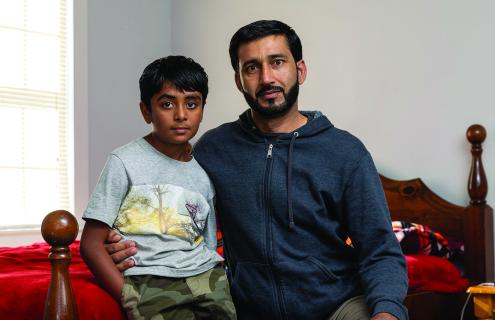
When Mashwani and his wife and son first came to Keene in March of 2022 as part of the national Afghan refugee resettlement effort, it was the end of a months-long journey that had taken them to Qatar, Spain, Virginia, and Concord, New Hampshire. It was also a new beginning that held great promise, including access to quality healthcare at Cheshire Medical Center.
Mashwani, as he is known by neighbors and coworkers, even embraced the opportunity for a job with us—becoming part of Team Cheshire.
“The reception has been wonderful and the people of the community are very nice,” Mashwani says, speaking through an interpreter. He and his family previously lived in a small village in Afghanistan. “The people here helped provide any assistance we needed, and they are still helping us whenever we need a ride to an appointment. We are very happy with the community.”
The warm welcome given to Mashwani’s family, the first Afghan family to be resettled in Keene, is a shining example of Cheshire’s impact on the community through its Diversity, Equity, Inclusion, and Belonging (DEIB) program. Cheshire’s DEIB goals include cultivating inclusivity at the Medical Center for diverse staff and potential hires, as well as community engagement aimed at fostering a welcoming environment for people with diverse backgrounds.
“I knew some people in the area interested in having Keene designated as an Afghan refugee resettlement community,” says Shawn LaFrance, vice president for Cheshire’s Center of Population Health, who has also worked as a volunteer with new refugee families in Concord. “I advocated with people I’ve worked with at Ascentria, one of the two resettlement agencies in New Hampshire, for Keene to be a resettlement community. The Neighborhood Support Team (NST) group doing this work here is excellent.”
Eric Swope, an NST co-leader and member of the Keene Immigrant and Refugee Partnership, explains, “We saw a big problem at the end of US involvement in Afghanistan and people wanted to offer help.”
Dozens of people collaborated to raise funds, find housing, and work with Ascentria to welcome the new family. Swope describes the effort as “extremely rewarding … enriching the community and its understanding of the world.”
In April, Mashwani’s family registered for primary care with the assistance of online interpreter services to address the language barrier. LaFrance knew that Mashwani also needed a job, so he arranged for him to meet with Cheshire’s human resources staff on the same day. Although his limited English prevented him from working in his prior profession of safety in
Afghanistan, he was grateful for the opportunity to find employment.
“We worked to identify positions Mashwani could do at this time and determined he could work in Environmental Services with his current English skills,” LaFrance says. “He wanted to work nights so he could be home during the day to take English classes with his wife and be available when his son is not in school. We were able to translate the necessary information for cleaning supplies he uses into Pashto.”
“Cheshire needed to be flexible in our hiring, as stated in our DEIB goals,” says LaFrance. “But now Mashwani is on staff here and working well.”
Mashwani is already making an impression among his new co-workers. “Many people have mentioned how helpful Mashwani is, how communicative he is, even with having limited English,” says Curtis Fortune, director of Environmental Services and Mashwani’s supervisor.
“I am happy with this job right now,” says Mashwani, although he is hopeful that as his English improves, he may be eligible to work in safety. “My goal is to help people in the hospital. That’s why I like this job.”